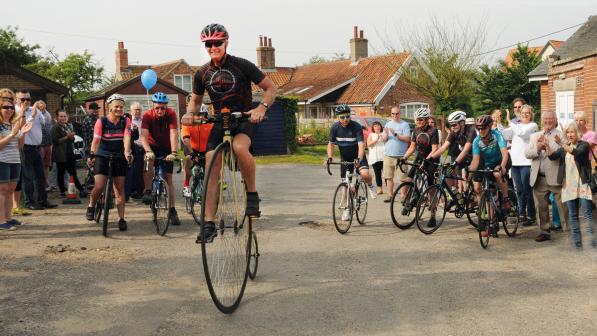Cycling in Cambridgeshire

Cambridge is Britain’s everyday-cycling capital, with around a third of trips in the town made by bike. Partly that’s down to the dry weather and flat landscapes, partly the place’s university roots, and partly the burgeoning new science parks whose well-qualified professionals know that the best way to get around is by pedalling.
But mainly it’s because of a self-sustaining cycle culture: if you like getting around on two wheels, there’s nowhere better to live in the UK. It’s no surprise if you turn up by bike here; it’s expected. The revamped station has a huge new multi-storey cycle park, though finding space to lock your bike in the centre can sometimes be tricky because of the sheer number of parked bikes. Facilities generally aren’t quite up to Dutch standards, but the town’s active, clever and well-organised cycle campaign – probably the country’s best – strives to make things ever better.
One of the best off-road cycle routes in the country runs along an old railway track – now a guided busway – 14 smoothly-surfaced miles from Cambridge to St Ives. It’s a favourite with local road cyclists, and it’s no surprise that Cambridge’s cycling clubs are very active – and have probably the best club websites in the land.
Around Cambridge are endless flat fens, a landscape of big skies, long straight – often blustery – roads, farmland, drainage channels, and quiet towns and villages. The route through Wicken Fen (part of NCN11) is a place to bring your binoculars and look for watery wildlife. NCN11 will take you from Cambridge to Ely, with its historic cathedral and attractive watersides.
The county’s other major town is Peterborough – formerly in Northamptonshire – which has a small network of central routes and several rural rides, including the circular 45-mile Green Wheel that loops around it.
Cycling groups and clubs in Cambridgeshire
CTC Cambridge (Cambridge)
http://www.cyclinguk.org/local-groups/cambridge
Sociable and non-competitive cycling in the countryside around Cambridge
Peterborough (Peterborough)
http://www.cyclinguk.org/local-groups/peterborough
http://www.ctcpeterborough.org.uk/
Rides on quiet routes in Cambridgeshire and around with experienced Ride Leaders
Bike Trial Academy UK (Cambridge)
http://www.cyclinguk.org/local-groups/bike-trial-academy-uk
http://www.biketrialacademy.uk/
Encourages new riders to bike trails, offers training and runs events
Camcycle, Cambridge Cycling Campaign (Cambridge)
http://www.cyclinguk.org/local-groups/cambridge-cycling-campaign
Campaign group offering occasional led leisure rides
Octagon (Ely)
http://www.cyclinguk.org/local-groups/octagon-cycling
http://www.octagoncycling.com/
Mixed ability group meeting several times a week for training and rides of 30 to 80 miles
Willingham Wheels (Cambridgeshire)
http://www.cyclinguk.org/local-groups/willingham-wheels
https://en-gb.facebook.com/wwheels/?ref=page_internal
Tuesday evening training rides and Thursday evening pub rides
Yaxley Riders (Yaxley)
http://www.cyclinguk.org/local-groups/yaxley-riders
Leighton Bromswold Cycling (Leighton Bromswold)
http://www.cyclinguk.org/local-groups/leighton-bromswold-cycling
http://www.bromswoldbikefest.org/
Organises the Bromswold Bike Fest raising money for two charities
Ramsey Cycling (Ramsey)
http://www.cyclinguk.org/local-groups/ramsey-cycling
Aiducation International Cambridge Chapter (Cambridge)
http://www.cyclinguk.org/local-groups/aiducation-international-cambridge-chapter
http://www.aiducation.org/en/Content/Static/About_us/Our_Team/UK-Chapter.html
Closed workplace group that raises donations for scholarships.
Gorilla Firm Riders (Peterborough, Cambridgeshire)
http://www.cyclinguk.org/local-groups/gorilla-firm-riders
What to take with you on your ride
The only thing you really need for cycling is a bike. And maybe a phone, and credit card: in Britain you’re only a call away from any service you might need.
But unless money is no object, it’s wise to take a few things with you on a day ride. A saddlebag or rear rack and panniers are best for carrying stuff. A front basket is second best. A rucksack is third best. Your sweaty back will soon tell you why.
Cycling short distances in jeans and t-shirt is fine, but on a long or strenuous ride – over ten miles say, or in hills – those jeans will rub and the t-shirt will get damp and clingy. Shorts or, yes, lycra leggings and padded shorts will be much comfier, and merino or polyester cycling tops wick away the sweat, keeping you dry and comfy. (They don’t have to be lurid colours.)
If rain’s in the air, pack a rainproof top. If it might turn chilly, take a fleece or warm top. But the thing you’re most likely to forget is the sunblock.
It’s remarkable how often you enjoy being out on the bike so much that you suddenly realise it’s getting dark. So take lights (which are legally required at night). They’re price of a sandwich, take no space, are easy to put on thanks to tool-free plastic clips, and the batteries last for ever.
Take a puncture repair kit (with tyre levers) and pump. Make sure it fits your valves, which will be either ‘Presta’ or ‘Schraeder’ – realising they don’t match is a very common roadside discovery! Carrying a spare inner tube (make sure it matches your tyre size) makes puncture repair much easier: mend the old one back at home. If you do get in trouble, some kindly passing cyclist will probably stop to help.
Using a helmet is a personal choice – they’re not legally required.
Cycling makes you thirsty, so take lots of water. Long-distance riders talk about ‘the bonk’ – a sudden loss of energy rendering you almost stationary. It’s miraculously and instantly cured by eating something sweet. On short rides you’re unlikely to run out of energy, but just in case, take a snack like flapjack, banana, chocolate or jelly babies.
Taking a packed lunch or picnic will save you money, though that hot drink and cake in a cosy cafe could yet prove very tempting!
Your phone GPS could be invaluable for showing where you are when lost; you can download free detailed UK maps and GPS software before your trip.
Paper maps are still useful, though, so take one: no power source or wifi signal required, and they’re great for suggesting possibilities or changes of plan.






